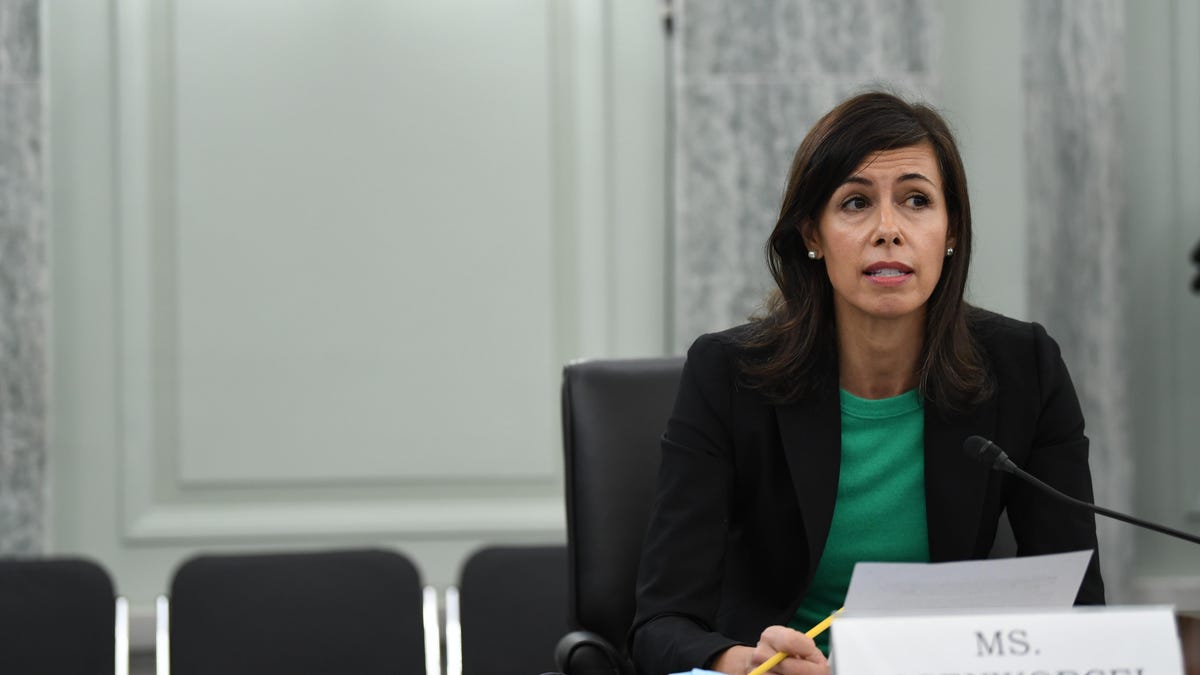FCC Chair Rosenworcel launches broadband mapping task force
The head of the new task force warns it could take until next year to fix the FCC's flawed maps.

Acting FCC Chairwoman Jessica Rosenworcel announced at her first meeting as head of the agency a new task force to improve the FCC's broadband maps. Rosenworcel, who previously served as an FCC commissioner, has criticized the agency's data collection process for years in testimony to Congress.
Federal Communications Commission acting chair Jessica Rosenworcel announced on Wednesday the formation of a new task force dedicated to implementing "long-overdue" upgrades to improve the agency's flawed broadband maps. But the new data isn't likely to be available until next year, an official leading the effort said during the agency's monthly meeting.
The new Broadband Data Task Force will work to make sure that data, which is supposed to show where broadband exists and doesn't exist in the US, is more precise. The agency has been heavily criticized for years for inaccuracies in the data that often overstates broadband coverage. The task force, which is composed of existing FCC staff, will be led by Jean Kiddoo, who chaired the agency's Incentive Auction Task Force.
In answering questions from FCC commissioners about the work of the task force, Kiddoo said it would "take awhile" to compile the data based on the complex systems needed to carry out the work.
"We're talking probably next year, but that's a guess," she said. "We'll try everything to get it quicker."
The FCC has acknowledged that the maps it uses to figure out how to distribute the billions of dollars in federal funding it offers each year to subsidize the cost of building out infrastructure are flawed. The problems with the current system for collecting the data stem from how the data is collected. The FCC relies on self-reported information from internet service providers, who are asked to report coverage for so-called "census block" areas. These areas often encompass miles of territory, and if ISPs report even a single home or business in a particular census block as having service, the FCC's current reporting method counts that entire census block as served. But that's not always the case.
Republicans and Democrats on the FCC and in Congress have long agreed that the data for mapping needs to be more granular in order to get an accurate picture of where broadband exists and where it doesn't.
The agency adopted rules in August 2019 to begin the process of getting more accurate maps. Congress passed the Broadband DATA Act in March directing the FCC to improve its mapping. But former FCC Chairman Ajit Pai, a Republican appointed under President Donald Trump, said the FCC didn't have the funds to implement Congress's requirements. In December, Congress allocated $65 million for broadband mapping as part of its COVID-19 relief bill.
Rosenworcel, who was appointed as acting chair of the FCC by President Joe Biden, has been one of the most outspoken critics of the FCC's flawed data collection methods. As a commissioner in the minority of the FCC, she publicly disagreed with her predecessor, Chairman Pai, pushing for the FCC to hold off on allocating funds as part of its Rural Digital Opportunity Fund until the agency could improve the accuracy of its data collection.
Pai argued that it would take too long to get better data and that service providers needed funds as soon as possible to connect more Americans to broadband.
In her first meeting leading the agency, Rosenworcel emphasized the need for the improvements to the current system, and acknowledged the agency has a complex task ahead.
"It's no secret that the FCC's existing broadband maps leave a lot to be desired," she said. She called the passage of the Broadband DATA Act and the subsequent congressional funding "good news."
But she added, "It's the first step toward better broadband policy by providing us with the information we need to reach everyone, everywhere."
The second phase of the Rural Digital Opportunity Fund is expected to use the more accurate data collection. Rules for this data collection were passed at the FCC's January meeting, under Pai. Rosenworcel said designating a new task force will ensure the agency gives the mapping issue the resources and attention it needs to tackle the complex task moving forward, much like the agency did when facing another complex task.
"This is going to require an all hands effort at the agency with expertise from multiple bureaus and offices," she said. "To get this done, I have decided we need to use the same structure we used in another big effort at the agency, the first of its kind wireless incentive auction."
Congress authorized the FCC's incentive spectrum auction to reallocate broadcast airwaves in 2012, and it took four years to design and plan before commencing in 2016.

